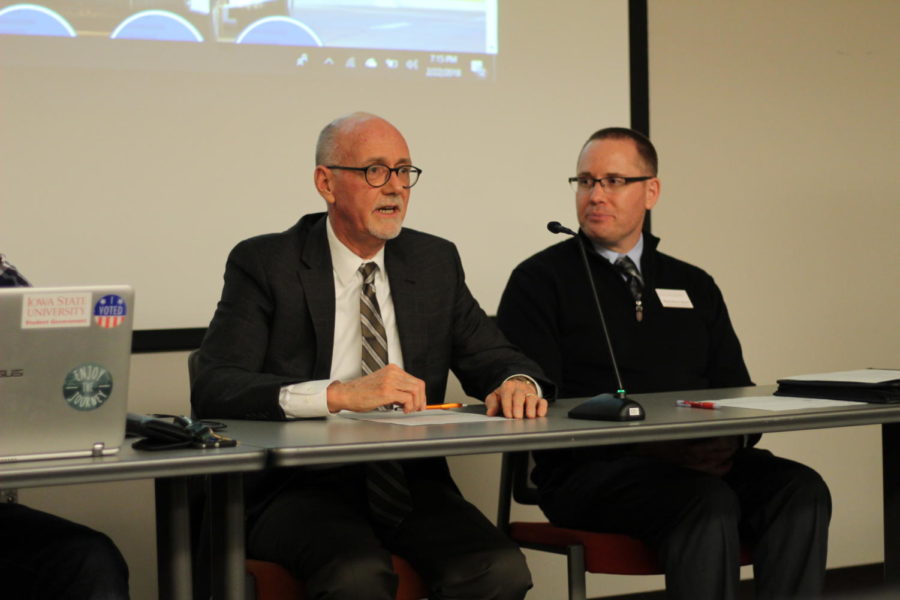- App Content
- App Content / News
- News
- News / Politics And Administration
- News / Politics And Administration / City
Ames mayor vetoes rental cap exemptions
August 6, 2018
Ames Mayor John Haila has vetoed the rental cap exemptions which were passed on July 31, making him the first Ames mayor to veto legislation in 12 years.
“[Haila] wrote that language added during last Tuesday’s meeting altered the ordinance to the point it was “inconsistent” with what the Council was attempting to accomplish in balancing neighborhoods between owner occupied and rental homes,” Said a press release from the City of Ames. “In part, the letter stated, “On Tuesday night, when the ‘definition’ of a bona fide rental was added in 13.300 (10) v. stating in part that a ‘bona fide rental includes an owner-occupied dwelling with a non-owner occupant who pays rent,’ I believe that the spirit and principle of what Council has worked on for months was compromised.””
The language Haila was referencing was the term “bona fide rental property”, which under the passed ordinance included properties where the primary owner rented out single rooms to family members while still living in the home.
Without this language a family member would not qualify as a renter under the exemptions.
The implication of this language, as stated in one example from the July 31 meeting, would mean a family who wants to rent out their property in the distant future could obtain a letter of compliance — the document needed to rent out a property — by renting out a single room to family member until that later date.
At the July 31 meeting, At-Large representative Amber Corrieri said she has had a family member living with them for years who had been paying rent in that time and asked why they, like other roomers, should not be applicable to the exemptions.
Ward One representative Gloria Betcher responded and said she did not support it.
“I think it is just one more way to undermine the cap,” Betcher said.
After the veto occured, Betcher told the Daily she supported the veto measure in this instance, agreeing with Haila that it undermined the intentions of the council and cap, but she said she would support limited exemptions.
“I haven’t been against the idea of exemptions, I have been against the proliferation of the types of exemptions,” Betcher said. “I was originally in favor, and still am in favor of limited hardship exemptions, but with every change we made more and more people would have a way to get an LoC. To me, this subverts the spirit and effectiveness of the cap in those neighborhoods.”
At the meeting, City Attorney Mark Lambert encouraged the council to add the language saying it could cause equal protections concerns under the constitution.
If the city were to define who is a legal renter and who isn’t based on family status, the courts could take issue with that, Lambert said.
Betcher said she hadn’t given that concern any thought before the July 31 meeting.
“The meeting was first time I had heard of that possibility so I hadn’t given it much thought,” Betcher said. “I take equal protections concerns seriously, but I hadn’t heard those concerns until the meeting so it wasn’t on my radar.”
The ordinance can be passed again at a future meeting. A two-thirds vote (4 votes in favor) is all that is needed to override the veto. At the previous meeting it had passed on a 4-1 vote.
Addressing the mayor’s comments that the ordinance passed on July 31 was inconsistent with the intentions of the council, Corrieri disagreed.
“We voted to add the language,” Corrieri said. “When an ordinance passes with four members of council, I think it is the intention of council to use the language as passed.”
Corrieri stated her disappointment in the mayor’s decision.
“I was disappointed in the veto as we have worked a lot with staff and the public on the exemptions,” Corrieri said. “No one was 100 percent satisfied with the ordinance but we got to a point where a majority of us were in favor of it. I wish the mayor would have better respected all the time we put into it.”
To be passed, the ordinance must be brought up to be voted on at a future meeting. This means on the current meeting schedule, the Council wouldn’t be able to vote on it until the Aug. 28 meeting.
“Myself and others are looking into creating a special meeting to put the ordinance on the Aug. 14 meeting’s agenda, otherwise we could be waiting upwards of a month before we have any exemptions,” Corrieri said.
‘For a complete explanation of the ordinance and changes made at the July 31 meeting, go here.
















